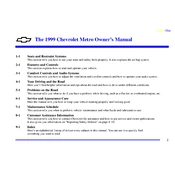Chevrolet Metro 1999 Owner's Manual


For a 1999 Chevrolet Metro, it is recommended to use 5W-30 motor oil for optimal performance and fuel efficiency.
The timing belt on a 1999 Chevrolet Metro should be replaced every 60,000 to 90,000 miles to prevent engine damage.
The recommended tire pressure for a 1999 Chevrolet Metro is 32 psi for both front and rear tires.
First, check the battery and connections for corrosion. Ensure the fuel pump is functioning and inspect the ignition system, including spark plugs and wires.
Common signs include dimming headlights, the battery warning light on the dashboard, and electrical issues. It's advisable to have the alternator tested if these symptoms occur.
To replace the air filter, locate the air filter housing, unclip or unscrew the cover, remove the old filter, and insert the new one, ensuring it's seated correctly before re-securing the cover.
Use a 50/50 mixture of antifreeze and distilled water, suitable for aluminum engines, in a 1999 Chevrolet Metro.
Maintain proper tire pressure, perform regular maintenance such as oil changes and replacing air filters, and drive at steady speeds to improve fuel efficiency.
To reset the check engine light, disconnect the battery for about 15 minutes, then reconnect it. If the light persists, have the vehicle's diagnostic codes checked.
The recommended spark plug gap for a 1999 Chevrolet Metro is 0.039 inches (1.0 mm). Always verify with a feeler gauge before installation.